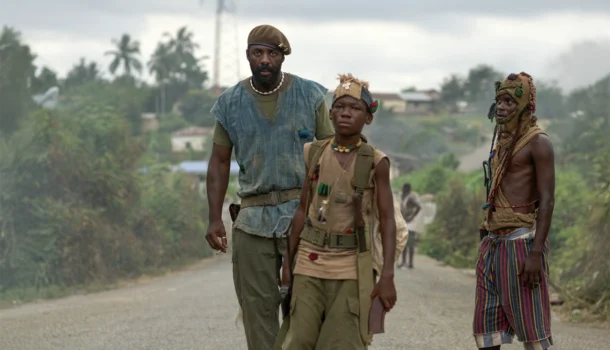Few films dare to confront — without gimmicks or escapes — the moral collapse spanning generations in lands scarred by civil wars and dysfunctional governments. “Beasts of No Nation” walks deliberately into that abyss. Rather than reaching for redemptive catharsis, Cary Fukunaga guides the viewer through an uneasy journey across a territory where childhood is buried beneath institutionalized savagery. The film doesn’t just recount a tragedy; it operates as a bitter X-ray of a world where brutality becomes heritage, method, language, and tool.
The director, who also wrote the screenplay and oversaw the cinematography, constructs his imagery with clinical detachment, refusing to dull the horror. Yet this rejection of aestheticization doesn’t mean the film abandons visual language as a critical device. On the contrary: there’s a constant tension between the rawness of the scenes and the careful orchestration of each frame, generating a contrast that strips bare the lie of heroic war. Savagery is exposed not as anomaly or mistake, but as a well-oiled mechanism driven by decayed ideologies and leaders unrestrained by conscience.
Agu, the protagonist, is not just another casualty of political chaos. He embodies the fragile cog devoured by the machinery of war, molded until any trace of autonomy is erased. His trajectory — from communal childhood to a jungle where he scrapes by on insects and desperation — isn’t a tale of transformation, but one of forced desensitization. Young Abraham Atah’s performance turns each restrained expression, each silence, into a testimony of a boyhood corrupted by emotional and physical enlistment. The jungle around him feels less suffocating than the density of violence that seeps into his soul.
Agu’s voiceover, addressed to a silent deity, acts as an intimate resistance against the collapse of his world. As he evokes family memories amid relentless brutality, he tries to preserve a fragment of his humanity — even as his body performs acts that estrange him from himself. In this paradox — a boy who kills while reciting tender memories — the film reaches its most painful and revealing truth: there is no full redemption, only emotional survival among ruins.
Idris Elba, as the Commandant, infuses the warlord figure with a disturbing ambiguity. He embodies tyranny with seductive charisma, never slipping into caricature. His coldness isn’t lack of affection, but a calculated affectation. By recruiting boys through paternalistic rhetoric and offering crumbs of protection, he constructs a loyalty structure rooted in emotional deprivation. The viewer, fully aware of the manipulation, is confronted with the discomfort of realizing how oppression, disguised as shelter, can seduce the abandoned. The Commandant doesn’t bark orders — he whispers, and in that whisper lies the poison of domination.
As Agu absorbs the logic of violence, it becomes clear that he is not merely coerced — he learns to act, chooses to kill, hesitates, then ceases to hesitate. The process of moral erosion is insidious and incremental. This is not just a child carrying a weapon, but a spirit torn apart and reshaped to serve a larger mechanism. The notion that he might be “saved” in the future is approached with skepticism — not due to a lack of hope, but because, beyond a certain point, rescue no longer means reversal, but reconstruction from wreckage.
The film’s core indictment goes beyond the African civil war. It strikes at global abandonment, political apathy, and the hypocrisy of international diplomacy. The manipulation of children as mobile weapons reveals not only the failure of local systems, but a universal collapse in protecting the vulnerable. There’s something chillingly current in the realization that, while geopolitical security is debated in air-conditioned rooms, boys like Agu dig through soil for larvae to ease their hunger.
A final layer of discomfort comes from the film’s external perspective: while the story is deeply rooted in African pain, its narrative lens belongs to a Western filmmaker. Even as Fukunaga handles the material with care and complexity, a symbolic void remains. Where are the local filmmakers with access to platforms of this scale? The power of works like “Amina” and “The Fisherman’s Diary” stands as a necessary counterweight — stories told from within, by voices that don’t just observe, but live it. The absence of such voices at the center of the conversation reveals another form of violence: cultural silencing.
Behind the fiction pulses a scream muffled by diplomatic convenience, economic interests, and superficial media coverage. “Beasts of No Nation” offers neither comfort nor answers. Its greatest strength lies in leaving the viewer stranded in discomfort, where every attempt to comprehend the horror is tainted by its irrationality. And in the end, what remains is not certainty of a future for Agu, but the haunting suspicion that, somewhere in the world, the next Commandant is already being trained — and may not even know it yet.
Film: Beasts of No Nation
Director: Cary Fukunaga
Year: 2015
Genres: Drama/War
Rating: 9/10

